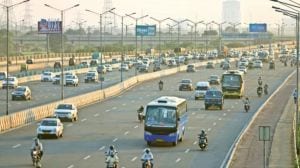Right to education
Madhya Pradesh Chief Minister Digvijay Singh hit the nail on the head when he said on the occasion of the release of his state's Human De...

Madhya Pradesh Chief Minister Digvijay Singh hit the nail on the head when he said on the occasion of the release of his state8217;s Human Development Report by Nobel Laureate Amartya Sen that universal elementary education would be the true vandana to Saraswati. The best thing that has happened for India as a result of the Nobel is the unprecedented attention Sen8217;s lifelong campaign for primary education for all is finally getting.
Many such as the authors of the PROBE report have long been toiling in the vineyard with no one buying the grape. Now there is some good news in the offing. Individual states, with a very diverse background, seem to have each found ways of India, in the immediate future, avoiding the stigma of being the largest collection of illiterates in the world.
The example of Kerala is, of course, well-known. The efforts of the Nair Service Society, the movement led by Sree Narayana Guru among the Ezhavas, and the efforts of the Dewan, Sir C.P. Ramaswamy Aiyar, had, even beforeIndependence, shown there was nothing inherently impossible about educating all sections of society. Then came the breakthrough in Goa, followed by the astonishing achievement in Tamil Nadu. Now, PROBE tells us that in the unlikely state of Himachal Pradesh illiteracy levels have been transformed from over 85 per cent in 1951 to under 10 per cent now. Eradication of illiteracy is, thus, not a problem of the country as a whole; it is a problem of some states, including, alas, some of the most populous states.
Unfortunately, the implications of this basic datum are not being adequately understood. In consequence, there is grave danger of the crusade being misdirected into irrelevant, even counter-productive channels. At the PROBE release, a brilliant young journalist said, to general approbation, that the reasons for India8217;s failure on the education front could be summed up in five words: 8220;Political apathy and governmental neglect.8221; From this he drew the inevitable conclusion that if politicians andgovernments could be compelled to do what they are otherwise negligent of doing, then and then alone would we achieve universalisation in primary education. To this end, he, in concert with Sen, urged that the Constitution be amended to make basic education a fundamental right. This, I am afraid, is a nostrum.
If states from Tamil Nadu to Himachal Pradesh have transformed the education scene, it is because education there has not been mired in political apathy or crushed by governmental neglect. Whether it was MGR in Tamil Nadu or Virbhadra Singh in Himachal, politics and politicians played a crucial role, often for divergent and sometimes for disreputable reasons, in stoking the education revolution. That it proved possible to effect revolutionary change in Goa and sustain it in Kerala owes something at least to effective and successful governmental intervention. To blame it all on politicians or inadequacies in the Constitution is to miss the point and make the wrong prescription. What we need to examineare the systemic changes in governance wrought in the successful states so as to work out the right formulae for the unsuccessful and less successful states.
To this end, the example of Madhya Pradesh is perhaps the most enlightening. Under Digvijay Singh8217;s Education Guarantee Scheme, the average number of schools opened has increased from under 1,500 a year till 1995 to over 10,000 a year now. This has been done by co-opting the local community through the panchayats, converting the state education department from a stumbling block to a facilitator, and determining that some schooling is better than no schooling. A key Bimaru state is, thus, being taken out of the educational rut which characterises the others. Indeed, what the Madhya Pradesh experience has established is the close correlation between poor governance in general and non-achievement in education in particular.
There is, thus, a clear correlation between massive illiteracy and the total absence of panchayati raj in Bihar, the leaching ofrepresentative local government in Uttar Pradesh, and what the Governor8217;s Address calls 8220;toothless8221; panchayati raj in Rajasthan, contrasted with the astonishing speed at which Madhya Pradesh, through effective panchayati raj, is racing towards universal elementary education. It is not by amending the Constitution but by implementing its provisions on panchayat raj that the Bimaru states will secure education for all.
Indeed, a little-known fact brought to light by Sen himself in a lecture some years ago illustrates the point. He said that whereas India produced six times as many graduates as China, it had only a sixth as many children at primary school. The Constitution gives the primary responsibility for higher education to the Centre and entrusts primary education almost entirely to the states. Had the Centre been given a larger responsibility for the social sectors, perhaps the inter-state distortions which have plagued school education might have been mitigated.
If the states have performed sounevenly, the root cause has been the failure to evolve an effective third tier of governance at the grassroots and the inadequate involvement of parent-teacher associations. Now, information technology has vastly increased the scope for quality distance education which can carry the best teaching into the remotest school.
Our sights should be set on moving beyond universalisation of a dreadful elementary education system towards more and better education. This requires an understanding of the distinction between rights and entitlements 8212; to use a Sen expression. The fundamental rights in the Constitution relate to the individual8217;s inalienable civil liberties. Primary education is an entitlement. As is food, employment, shelter, health care, and environmental protection. These call for class action, not the individual agitation of personal rights in the courts of law. True, the Directive Principles of State Policy have not, in practice, adequately directed state policy. So, there may be a case for evolvinga concept of justiciable fundamental entitlements. But the answer does not lie in transferring class entitlements to the domain of individual rights. That will only clog the courts further, and abort political action on cases that will remain sub judice for years, as has happened with panchayat elections in Bihar.
- 01
- 02
- 03
- 04
- 05































